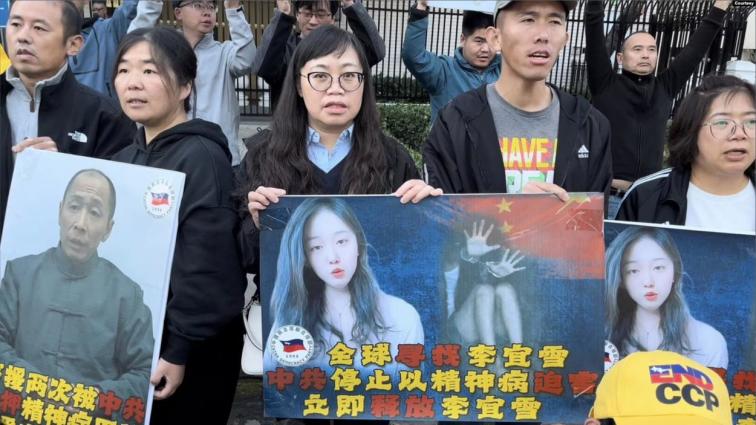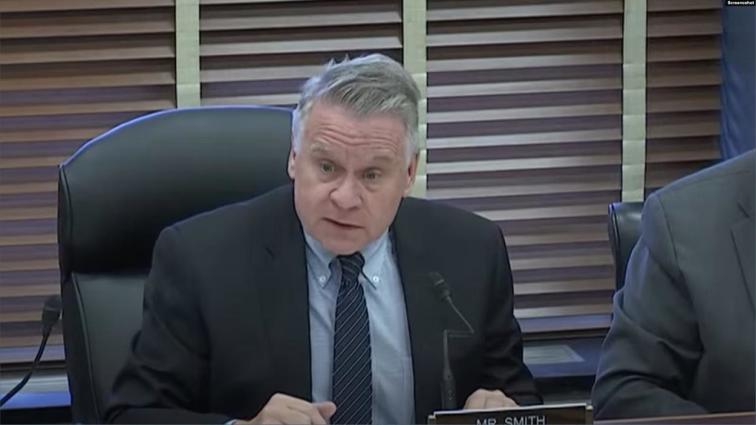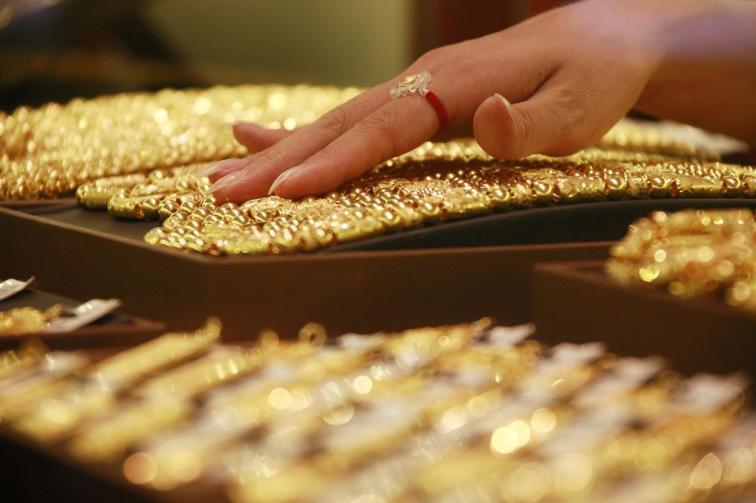In the early hours of October 1, 2024, a comet that appears once every 60,000 years streaked across the skies over Beijing, sparking widespread discussion. Some bluntly remarked, "The appearance of a broom star (a traditional term for comets) is not a good omen." (Video screenshot)
People News - Erasure of Premier Li Qiang’s Verbal Gaffe
On March 5, during the opening session of the NPC at the CCP’s Two Sessions, Premier Li Qiang made a significant verbal slip while delivering the government work report. He mistakenly said, “China’s development will surely ride the winds and waves, but fare thee well,” before correcting himself to “the future is promising.”
Making a verbal slip is not shameful—many politicians around the world make such mistakes. What’s truly embarrassing is the CCP’s immediate, almost panicked effort to cover it up. The CCP’s state media edited out the slip in all live broadcasts, promotional materials, and reports. Overseas netizens couldn’t help but comment: “Looks like someone accidentally blurted out the truth.” “Xi Jinping must be thinking: It’s okay if Li Qiang misspoke. The bigger his blunder, the less people will remember mine...” “China’s future is promising; the CCP’s days are numbered. Regret won’t help them now!” “This reminds me of the movie The Last Emperor. When young Puyi was impatient during his coronation, the eunuch by his side hurriedly said, ‘It’ll be over soon,’ which turned out to be prophetic.”
Defense Minister's Investigation Highlights Military Corruption Scandal
Defense Minister Dong Jun, appointed in late December 2023 to replace Li Shangfu, who was abruptly dismissed, has faced a peculiar plight. He was not made a State Councilor at the Two Sessions nor a member of the Central Military Commission at the July Third Plenary Session, making him a rare non-vice-national-level defense minister in CCP history. This led to awkward public appearances, often seated offstage during international and domestic events, sparking public discussion.
Worse yet, rumors of Dong being under routine investigation have emerged due to ties with former CMC member Miao Hua, who was implicated in corruption scandals. Reports suggest Dong’s promotion involved illicit exchanges with Miao. Dong’s investigation, allegedly based on incriminations by fallen military officers, has reignited attention on corruption within the PLA. His two predecessors, Li Shangfu and Wei Fenghe, are reportedly under investigation or missing.
Most recently, on December 25, former Lieutenant General You Haitao and Southern Theater Navy Commander Li Pengcheng were stripped of their national NPC delegate status, further exposing military corruption.
Local Governments Borrowing from Temples
Amid severe fiscal strain, CCP local governments have resorted to desperate measures. Public servants in cities like Nanjing, Tianjin, Guilin, and Shandong faced salary delays. In Jilin, pensions were suspended, while in Wuhan, charity workers were advised to “find their own solutions.” Protests, banners, and petitions have become common among unpaid government workers.
In Tianjin’s Hebei District, at least four government departments sought loans from local temples, only to be refused. The temples claimed poverty, infuriating officials.
Similar financial struggles emerged in Nanjing’s Gaochun District, where most civil servants went unpaid in August. With intervention from the Nanjing municipal government, Jiangning District provided financial assistance.
Wuhan’s Jiang’an District directed local charities to resolve salary issues independently, but foreign donations, a significant funding source, have dwindled due to the souring US-China relations and the CCP’s July enactment of the Anti-Espionage Law.
Taiwan’s President Challenges CCP’s Intimidation
The CCP conducted multiple military exercises around Taiwan this year, combining verbal and physical intimidation. However, Taiwanese President Lai Ching-te dismissed the threats during a press conference marking his first 100 days in office, stating:
“China (the CCP) wants to annex Taiwan not for territorial integrity. If it were about territorial integrity, why haven’t they reclaimed the lands ceded to Russia under the Treaty of Aigun?”
Lai’s remarks sparked widespread discussions, highlighting the CCP’s history of territorial concessions, suppression of dissent, and deceitful diplomacy. The comment also drew attention to recent territorial agreements, such as land ceded to India in southwestern China.
Massive Fraud Scandal Involving Carbon Credits
This summer, Germany exposed a large-scale CCP fraud involving carbon credits. The German Environment Agency (UBA) conducted a thorough investigation of 66 Chinese climate mitigation projects and found that 45 of them were involved in fraudulent claims and data exaggeration to secure EU emission reduction certificates, valued at approximately €1.5 billion. Many applications were submitted during the peak of the global COVID-19 pandemic, a time when travel for verification was severely restricted.
The investigation revealed a total of six million tons of carbon dioxide equivalent credits, with a market value of €1.5 billion. According to UBA Director Dirk Messner, only about four million tons of credits could be reclaimed, resulting in a direct economic loss of approximately €500 million. The German Justice Department has since launched an active investigation, working with international law firms to trace the fraudulent projects and individuals involved. Germany’s Ministry of the Environment has repeatedly updated parliament on the scandal and is actively pursuing legislative reforms.
The CCP has yet to respond to the German investigation or fraud accusations. Their silence suggests uncertainty or perhaps guilt.
Oil Tankers Transporting Industrial and Edible Oil Causes Scandal
In July, a scandal involving China's oil transportation industry surfaced, revealing that oil tankers were being used to alternately transport coal-derived industrial oil and edible oil without proper cleaning. The state-owned enterprise China Grain Reserves Corporation (Sinograin) became the focus of international media attention. Following a series of food safety scandals in China, such as toxic milk powder, Chinese consumers have grown increasingly sensitive to such issues. This revelation triggered widespread outrage. International experts attributed the chaos to systemic corruption, highlighting the structural pathology of the CCP. The scandal served as yet another reminder of the CCP’s disregard for human life.
Anti-Corruption Campaign Turns Into a Money-Grabbing Scheme
The CCP’s anti-corruption campaign has increasingly become a means to grab funds. Amidst economic downturns and financial shortfalls at both central and local levels, the CCP has resorted to fines, tax hikes, anti-crime campaigns, and censorship crackdowns as methods to generate revenue. The anti-corruption efforts, in particular, have become a shortcut for addressing financial woes.
According to former CCDI official Wang Youqun, 33 officials accused of embezzling over 100 million yuan were prosecuted in 2024. From December 10 onward, at least 15 provincial-level officials or higher were disciplined, with publicly disclosed confiscated assets amounting to at least 5 billion yuan.
According to the CCP's state media outlet, Xinhua Net, which reported on the 2024 anti-corruption "report card," in the first three quarters of the year, national disciplinary and supervisory agencies opened 642,000 cases. Among them, 58 cases involved provincial- and ministerial-level officials. Since the start of the year, nearly 600,000 cases of misconduct and corruption have been investigated, with 462,000 individuals punished and 15,000 cases referred to the prosecution. In the first 11 months, 92,000 cases of formalism and bureaucratism were addressed nationwide, according to statistics. Disciplinary actions and education measures were applied to approximately 135,000 individuals, with around 86,000 receiving formal disciplinary actions under party and administrative regulations. Both the number of cases filed and high-level official investigations have increased compared to the same period last year.
The Central Commission for Discipline Inspection (CCDI) and the National Supervisory Commission's report shows that in the first 11 months of the year, nearly 92,000 cases of formalism and bureaucratism were addressed, with about 135,000 individuals criticized, educated, or otherwise dealt with. Around 86,000 of these individuals were subjected to disciplinary measures under party regulations or administrative penalties.
Such figures reflect a scale of anti-corruption that is rare globally.
Frequent Public Killings Undermine the “Safest Country” Narrative
The CCP has long touted China as one of the world’s safest countries. State media repeatedly emphasized this claim throughout the year.
However, on November 11, a major violent incident in Zhuhai, Guangdong, contradicted this narrative. A 62-year-old man named Fan drove his car into exercising citizens at the Xiangzhou District Sports Center, killing 35 people and injuring 43. Police revealed that Fan’s motive was dissatisfaction with the division of assets following his divorce.
This year, indiscriminate killings have surged across China, involving stabbings, vehicular attacks, poisonings, and sword attacks. These incidents include adults attacking schoolchildren, students killing each other, and men targeting other adults. In mid-November alone, at least eight such public killings were reported in the media.
Online commentators have referred to these as "Xianzhong incidents," a term describing indiscriminate attacks driven by societal revenge. These events have directly undermined the CCP’s claim that China is one of the safest countries in the world.
University Students Banned from Night Rides
Following the CCP’s crackdown on Halloween celebrations in cities like Shanghai and Hangzhou, authorities turned their attention to nighttime cycling events.
The controversy began when college students in Zhengzhou, Henan Province, imitated a group of riders who cycled over 50 kilometers to Kaifeng to enjoy local delicacies. The Kaifeng government, aiming to promote its economy and tourism, announced that several scenic spots would offer free entry to college students at night.
By November 2, over 10,000 people participated in the night ride from Zhengzhou to Kaifeng, and the number exceeded 200,000 by November 8. The students showed patriotic sentiment, waving Chinese flags, singing the national anthem, and displaying slogans such as “The motherland must and will be unified.” The event also attracted participants from nearby provinces, including veterans and young professionals.
However, the CCP grew alarmed, possibly recalling events like the “White Paper Revolution,” the Hong Kong anti-extradition protests, or even the 1989 Tiananmen student movement. Authorities urgently banned the rides, ordering students to return to campuses, locking schools down, and restricting outdoor activities. In Zhengzhou and Kaifeng, non-motorized vehicle lanes on key roads were closed for nearly a day, and bike-sharing services imposed restrictions on cross-district rides.
The crackdown sparked further resistance. Some campus gates were forcibly breached, students protested online, and similar night rides were organized to Tiananmen Square and other symbolic locations.
Observers abroad noted: “The CCP creates its own enemies. This has been true throughout history and remains so today. The CCP’s fear ensures it will never resolve its problems. Even the smallest non-political activity can spiral into rebellion, leaving the regime trembling at every minor disturbance.”











News magazine bootstrap themes!
I like this themes, fast loading and look profesional
Thank you Carlos!
You're welcome!
Please support me with give positive rating!
Yes Sure!